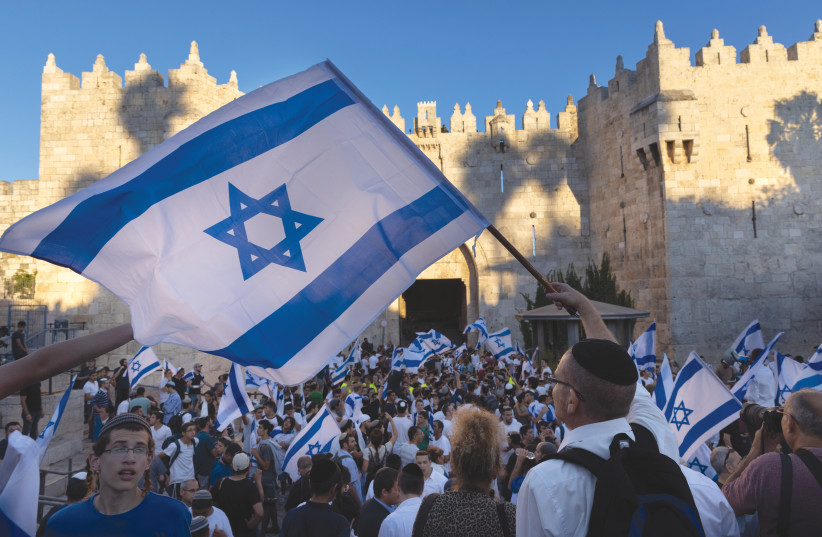Every Sabbath, Zionist congregations in Israel recite the “Prayer for the State of Israel” that was instituted by the Chief Rabbinate. Many Zionist congregations around the world will also include this prayer after the one for their own national government. Usually, this prayer is recited with a sense of pride or, at worst, with indifference.
Yet in recent decades, it can sometimes spark discomfort when congregants dislike the current officeholders or their controversial policies. Particularly in Israel, where major political protests frequently take place on Saturday nights, the prayer for the state can create a sense of dissonance: Why should I pray in the morning for a government whose policies I will lament at lunch and protest at night?
The tension is further acerbated by widely distributed “parsha sheets” which are meant to feature Torah insights but frequently contain political analysis and editorials. On a few occasions, one will even hear of synagogues changing the prayer or not reciting it all.
Don't bring politics into Jewish prayers
To my mind, this is a very bad idea. Religion has a role in the public sphere, but politics should not have a place in our sanctuaries. A person’s religiously inspired perspectives on justice and leadership will likely impact on how he or she thinks about current policy dilemmas. But debates about specific laws or policymakers have no place in the synagogue in which we pray for more general goals like peace, sustenance, righteousness and tranquility.
Part of the problem stems from a misunderstanding of the contemporary role of the prayer for the state. The notion of blessing the local ruler originated in the first biblical exile. Jeremiah, in addressing exiles from Jerusalem living in Babylon, urged them to “seek the welfare of the city to which I have exiled you and pray to the Lord in its behalf; for in its prosperity you shall prosper” (29:7).

“Pray for the welfare of the government, for were it not for the fear of it, man would swallow his fellow alive”
Avot 3:2
In late antiquity, the sage R. Hanina asserted, “Pray for the welfare of the government, for were it not for the fear of it, man would swallow his fellow alive” (Avot 3:2). We pray for the government, since we are dependent on it for our security and prosperity.
Some 14th-century halachic texts began to mention a generic idea to “bless the King,” with others adding that God should “help him and strengthen him against his enemies.” Yet these prayers were also utilized to show loyalty to the governing reign with whom the fate of the local Jews rested. We thus have records of prayers for countless kings and feudal leaders, the pope, Russian czars, Napoleon, and many other historical figures.
One of the better-known prayers for the government, still recited to this day in many places, is Ha’noten Teshua, a 16th-century prayer that seems to have originated with communities of Jewish exiles from the Spanish Expulsion. The prayer begins, “He that gives salvation unto Kings, and dominion unto Lords, He that delivered his servant David from the sword of the enemy… bless and keep, preserve and rescue, exalt and magnify, and lift up higher and higher, our Lord…,” with the appropriate ruler’s named added to the prayer.
It then goes on to add that God should protect him and extend the days of his rule. Perhaps most significantly, it then adds a prayer that the ruler should act with mercy toward the Jewish community and that God should protect and redeem the Jewish people.
The text, as many have noted, is laden with tension about the tenuous political situation of the Jews. Moreover, it utilizes expressions from various biblical texts in which the broader context indicates a hope for redemption and revenge from suppression and exile.
IT’S NOT a perfect prayer for democratic countries in which Jews live as protected and equal citizens. Nonetheless, the text remains sufficiently generic to request wisdom for the current leaders toward instituting policies that protect the tranquility and prosperity of society in general and the Jewish people. Synagogues should remain free from the political divisiveness overwhelming so many countries around the world today. We can continue to pray for the well-being of the state without debating the current government’s policies.
To a large extent, this goal is successfully accomplished with the standard prayer for the modern sovereign state of the Jewish people. Composed by the first Ashkenazi chief rabbi, Issac Herzog, it beseeches God to bestow “[His] light and truth upon its leaders, ministers, and advisors, and grace them with Your good counsel.” Of course, not everyone agrees that they are regularly acting with wisdom or good counsel – which is precisely why we pray for God to grant it to them!
Nonetheless, during the heyday of the Oslo Accords, several senior Religious Zionist figures, including Rabbis Shlomo Goren and Moshe Tzvi Neria, altered the text either to no longer bless its leaders or to pray for alternative figures who would better lead the Jewish people. Rabbi Avigdor Nevenzahl, with the support of Rabbi Avraham Shapira, amended the text to pray that “bad council” should be eradicated, while adding a passage to strengthen the residents of Judea and Samaria, the Gaza Strip and the Golan Heights.
These changes received some support but did not become too widespread, even among opponents of the peace accords, precisely because the original text was sufficiently broad and generic so as not to endorse any specific leader or policy. This is the correct approach that we must continue to follow as we passionately pray for our beloved homeland while continuing to debate the wisdom of its leaders and their policies.■
The author is the director of the Halachic Organ Donor Society and post-doctorate fellow at Bar-Ilan University Law School. director@hods.org
